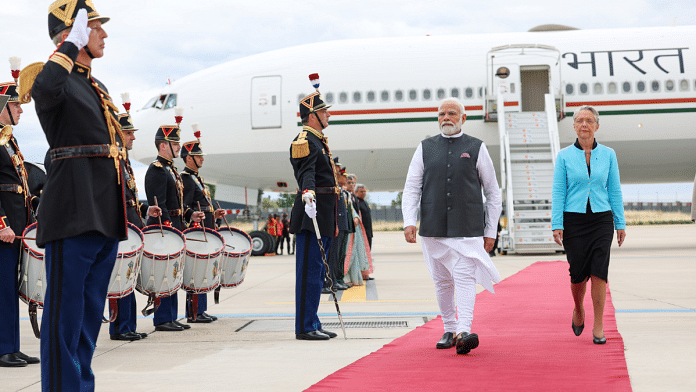New Delhi: India’s strategic partnership with France is at a ‘turning point’, Prime Minister Narendra Modi said as he travelled to Paris and recalled how bilateral ties in sensitive areas like defence, space and nuclear cooperation date back to a period when the West did not share a friendly disposition towards New Delhi.
Modi underlined that it was no surprise that France was the first country that India signed a strategic partnership agreement with.
“As far as 25 years of the strategic partnership is concerned, I feel we are now at a turning point. If we look at the post pandemic global order and the shape that it is taking, I think the positive experience of our strategic partnership is an important step ahead. So, we look forward to working on a roadmap for the next 25 years of the strategic partnership, which I think is very important for the relationship,” Modi said in an interview to French financial daily Les Echos.
Ahead of his two-day official visit to France that began 13 July, the prime minister asserted that France had supported India during difficult times.
“Our partnership in sensitive areas like space and defence go back to five decades and more. It was a phase when the West did not have a friendly disposition towards India. So, it is not a surprise that France was the first Western country with which we declared a Strategic Partnership. That was a difficult time for the world, including for India. Since then our relationship has transformed into a partnership that is important not just for our two countries, but is of great geopolitical consequence,” he added.
Invited by France President Emmanuel Macron, the Indian Prime Minister will be the Guest of Honour at the Bastille Day celebrations in Paris on Friday.
The relationship has been “steady and resilient in the darkest storms” as well as “bold and ambitious in looking for opportunities”, the prime minister said.
Modi’s ongoing visit is expected to pave the way for India to acquire naval version of 26 Rafale fighter jets and three additional Scorpene submarines as a part of its maritime military ambitions, as well as a possible partnership on jet engine technology.
The prime minister further said that he placed special emphasis on India-France strategic partnership with France. “I made my first visit to France in April 2015, within a year of entering office,” he added.
Also Read: How France is ready to help India diversify from Russia — build fighters to submarines
China angle & UNSC seat
On the growing tensions with China along the borders, Modi expressed India’s position on resolving differences between the two countries, stating the significance of ‘peaceful resolution of differences through dialogue and diplomacy’.
To a question on the cooperation that the two countries are looking forward to in the Indo-Pacific area, Modi asserted India and France are “two major resident powers” in the region. “Our partnership aims to advance a free, open, inclusive, secure and stable Indo Pacific region, working together and with others in the region who share our vision,” he added.
The Prime Minister reiterated his stance on India’s position in the global order, declaring that rather than gaining, India is ‘regaining’ its rightful place in the world.
“India brings its own unique and distinct perspective and voice to the global discourse — and it always stands in favour of peace, a fairer economic order, the concerns of the weaker nations and global cohesion in addressing our common challenges,” he observed.
Modi also emphasised on India’s bid for a permanent membership in the United Nations Security Council.
“How can it (the UN) claim to speak for the world when its most populous country, and its largest democracy, is not a permanent member? And its skewed membership leads to opaque decision making processes, which adds to its helplessness in addressing the challenges of today,” he asserted.
(Edited by Tony Rai)
Also Read: India-France space alliance key to Delhi’s ambitions. But it must deepen ties with Quad too



